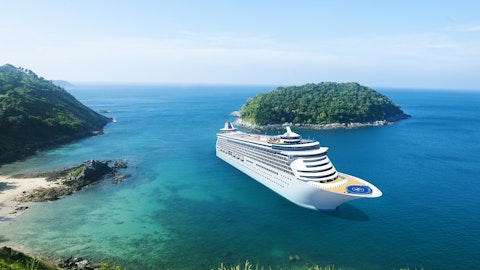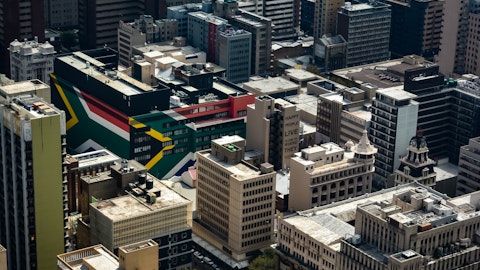Then we have another gentleman named Gary Morris. When we picked up the extrusion line, and I’m going to speak to that in a moment, when we picked up that, Gary was the founder of that idea and worked on that idea for many years and sold a lot of the extruded plastic to Berry Plastics and had that Honda and Toyota. So he’s very well-versed in the pallet industry, and we have him on full-time as well. So we’ve got now more bootstrap actually worked for Greystone as opposed to just stocking and non-stocking distributors. So we are excited about that. And we’re generating a lot of direct calls directly to customers. So we will be having a lot more of our customers as opposed through a distributor. Now, in terms of the extrusion line, we are making our dye adjustments in Austria on that equipment.
And the Austrian dye that we’re making for, it’s an extruded part. This part will look more like just a traditional wooden pallet. And this, we’ve been testing it in Austria. I anticipate that, again, we’re probably behind schedule on that as well, but I’ve seen some parts that they’ve put down. And I would think in the next four to six weeks we’ll have that dye in. So we will be making pallets that are made to order, more made to size. And Toyota is actually — has expressed interest in that again. They tested this product in a different form some time ago. And it’s a lightweight product that can be used as an export size. So we’re excited about that. But no, to answer your question, we’ve really have more boots on the ground now, full-time pounding on doors.
So we’re excited about that and excited about the results. I will say in the pallet business, nothing happens quickly. As Robert, as you know more so than any other, I’m sure you’ve seen this for the last 20 years. And you just keep knocking on those doors, and now we’ve got more boots to help us do that.
Robert Littlehill: Thank you, Warren.
Warren Kruger : Robert.
Operator: And we’ll take our next question from Brian Webb [ph].
Unidentified Analyst: Hi, yeah, thanks for taking the question. I’m wondering if you could provide some guidance on gross margin percentage going forward. Thanks.
Brice Dille: Well, I will say our gross margin has been awful. What happens with us is sales really, once you cover your fixed costs, dropping sales really affects our margins. And so we really need to drive our top-line, and I would think that that margin, I don’t think, I know that that gross margin as a percentage would go up over that 20% mark. And that’s where we need to be, and that’s where we’re striving to be.
Unidentified Analyst: Got it. Thank you.
Operator: [Operator Instructions] And we’ll go now to Anthony Perala.
Anthony Perala: Hey, Warren, sorry. Just a couple additional ones here. In the 10-Q, there’s a disclosure about a warehouse fire. Any details you could give on that? And just the kind of time to resolution there would be helpful.
Warren Kruger : Yes, sir. We have some storage area. Our manufacturing facilities, we have 260,000 square foot manufacturing facilities that are in Bentendorf across the street from one another. We also have a recycling center, a 50,000 square foot recycling center about two miles from there. In addition to that, we have storage in a town called Comiche [ph], Iowa, and that’s 35 minutes away from our manufacturing facility. It’s out in the country. We bought two 25,000s built that are across the parking lot from one another. And those are older facilities, they are not sprinkler facilities. No, there’s no hydrants out there. It’s really in the middle of the country. So we’ve been using these for storage for some time. And we have a lot of our customers that we keep inventory so that when they order, we’re ahead of the game.
The fire started with an electrical fire, we don’t know even to this day. We haven’t gotten the final fire report, but it was not an accelerant of any type. It was just an electrical fire that, in a weird way, I think it’s going to help us long-term. Because one of our –with the fire didn’t burn the building down, but it burned pallets on a portion of the building. And it burned a portion of the building. So we have the fire adjusters. And we’ve been in touch with the insurance company, and so we’re well on our way to eliminating any there. In the meantime, we have inventory across the street. And we have space across the street, so we can’t move inventory out there. So we’ll have some sort of split with the insurance company, I would anticipate, in the next 30 to 60 days.
And we’ll build that facility back, or we’ll build another facility. And so it’s really more of an inconvenience than it did anything else. It was a sad event. But like I said, in a way, it might help us because we always fight this fire issue with many of our customers. And so we’re going to be in touch with UL and FM as we’ve worked for the years. There’s always an issue with what happens in a plastic pallet fire. Well, we now know what happens in a plastic pallet fire. And if that were a warehouse full of wooden pallets, half the county would have seen it. So we think that that’ll help us with FM and UL in finally getting over this issue that plastic pallets are more dangerous than wooden pallets.





